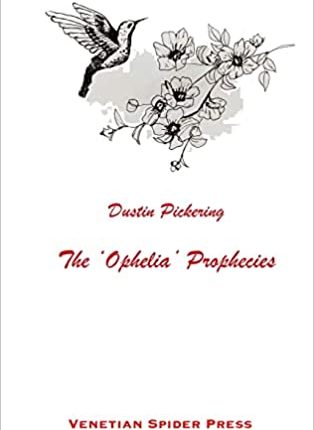Squandering Artistic Wealth, an article by American Poet Dustin Pickering
Based on the new poetry book The "Ophelia" Prophecies by Dustin Pickering
Squandering Artistic Wealth
“…the artist, who does not have to atone for his good periods— He is rich enough for them: he is able to squander without becoming poor.”
-Friedrich Nietzsche, The Will to Power
Following the period of intense creative prowess that inspired my collection The ‘Ophelia’ Prophecies (Venetian Spider Press, 2022), I met with stalemate in creativity. After an interesting and intense heartbreak I began to ruminate on a previous idea, returning again to Shakespeare. I previously bookmarked my Riverside edition at one of Hamlet’s soliloquies with an article (several years old) concerning Broca’s area and language capacity. This eerie realization followed a discussion with my Valentine date whose grandmother was dying with dementia: she told me she was learning about Broca’s area and its effects on patients with dementia. We stopped talking for a short period after I disappointed her by failing her expectations.
‘Ophelia’ represents the Gaia principle I identify as the Nature Spirit. Hamlet is the irrational mind of humankind that usurps Nature’s benevolent power in an act of madness—yet the irrationality is framed such that it is a clever ruse. In the human heart we know of our sinful natures but we deny it, leading to existential despair. In this process we are alienated from our true selves. This obsession with the human existential subject combined with world turbulence necessitated the creative energy of The ‘Ophelia’ Prophecies. I felt as if I inhabited a world of creative power that merely breathed through me. The drama between Hamlet and Ophelia also served an alternate metaphorical purpose. I underwent my own private heartbreak. I put many poems from Facebook posts into this 98-page manuscript, and dedicated it to sufferers of Borderline Personality Disorder. Later I suffered another romantic failing as the book was in the editing process. This person drew another creative breath from me. I composed a poem now known as “You Are the Best” published in Nepal. The poem intended to address the woman, a poet whose verses astonished me but were also dark and depression-laden, but I reconsidered this when a friend, Sujatha, noted the poem was written to comfort myself. These posts and responses are still on my Facebook profile.
Once The ‘Ophelia’ Prophecies was published I fell into a creative slumber. Oddly between the two heartbreaks, language fell from the air poetically to inspire my writing with passion. Even my dear friend, the scholar and poet Troy Camplin, noted the change in my poetics. He preferred the newer poems. I dialogued with my friends and followers on Facebook about the poems without addressing the sudden shift in style. I privately considered them to be a destruction of language through threaded concepts. Imagine finding a beautifully written page and ripping it to shreds, then reassembling it haphazardly. That page is language in this case. I was not aiming for a linguistic philosophy or new poetics, but rather the sensation of childishly detonating the internal dynamics of language by ripping it solemnly to pieces. I wrote each poem as if releasing the power of an atomic bomb by splitting each atom of linguistic power and piecing it back together with conceptual conscientiousness. Attentiveness remained strong in the process.
The two romantic failings spurred a strong creative impulse that resulted in a poetry collection and many stray poems on differing themes. I believe I invested my poetic wealth rather than squandered it, and I await the next major creative episode.
As Nietzsche suggests, I will not atone for my good periods—each poem is an investiture in the treasury of wisdom; the catalyst of thought is creative sparring with life, but for me the deepest consolation through loneliness and despondency is the ability to create marvelously—to see not in the light, but in the dark.
Bio of the writer: Dustin Pickering is founder of Transcendent Zero Press. He has contributed writing to Huffington Post, Café Dissensus Everyday, The Statesman (India), Journal of Liberty and International Affairs, The Colorado Review, World Literature Today, and several other publications. He placed in the top 100 out of 12,500 entries for the erbacce prize in 2021, and was a finalist in Adelaide Literary Journal’s first short fiction contest. He hosts the popular interview series World Inkers Network on YouTube.


Comments are closed.